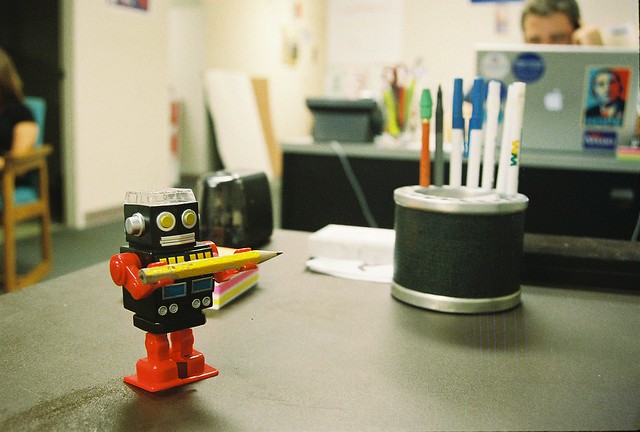The challenge we face as educators to prepare our students for uncertain futures and an ever-changing workforce isn’t anything new. That’s a big reason the district vision was reshaped years ago to put key 21st century capacities at the center of recent curriculum revisions. Multiple studies have shown that large numbers of jobs are at risk as programmed devices and automated systems continue to seep into the workplace. With workplace automation on the rise, the question of how we educate people for an automated world becomes even more pressing.
A recent NYTimes article “How to Prepare for an Automated Future” is a great read that affirms much of what we’re currently doing in our classrooms. The article touches on all of our 21st Century Capacities, making the claim that schools will need to teach the traits and skills that machines cannot easily reproduce–creativity, critical thinking, emotional intelligence, self-direction, and collaboration. It’s a short read, and I highly recommend reading it in its entiry, but the quote that stood out to me the most was this:
People still need to learn skills, the respondents said, but they will do that continuously over their careers. In school, the most important thing they can learn is how to learn.
This quote reminded me of a conversation I had recently with a good friend who does not work in education, but as a marketing & communications director. He was explaining to me how more than ever his job demands adaptability and new learning. As industries constantly evolve and the foundations of our economy remain somewhat shaky, he can’t rely on the stability of one or two jobs that span his entire career. In the ten years that I’ve known him, he’s had successful jobs for three different architecture firms and, as of two weeks ago, a construction company. As he splits his time between an architecture firm and the construction company, he must now, on his own, “up-skill” by teaching himself key aspects of the construction industry. This means knowing which questions to ask and involves a great deal of online research. In short, it means knowing how to learn.
Is my friend complaining? Not at all. And it’s because he’s positioned himself to work in a field that cannot be easily automated or outsourced, and he’s honed his skills and his capacity to learn (often leveraging technology) in a way that allows him be more efficient with his time and resources. This increased efficiency has expanded his opportunities for more work and income, yet not at the expense of time away from his family and personal interests.
I think it’s worth mentioning that my friend is also one of the most creative people I know. His creativity and passion for the arts have allowed him to write and record some highly regarded music, and I doubt he’d be a successful songwriter or marketing & communications director if he didn’t come from a community and educational system that fostered creativity and supported the arts, as well as the core subject areas.
UPDATE:
For some insights on how communities need to come together to shape and thrive in future economies, this piece by Thomas Friedman in the NYTimes is essential reading.

